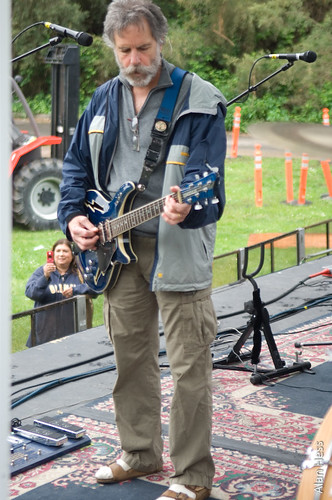Marin Independent Journal
Paul Liberatore: His hour to shine
Friday, March 04, 2005 - David Gans, known among Deadheads as the longtime host of the nationally syndicated radio show "The Grateful Dead Hour," has been producing a monthly "invitational" night at Sweetwater in Mill Valley that has been attracting name musicians, getting good buzz and drawing full houses.
It didn't hurt that his first show boasted a surprise appearance by the Dead's Bob Weir, and that it has been attracting guest musicians the caliber of the Dark Star Orchestra (the foremost Grateful Dead cover band), the Rowan Brothers, Steve Coyle of the Waybacks and former Jerry Garcia cohorts David Nelson, Martn Fierro and Henry Kaiser.
Larkspur singer Corinne West, along with Suzy Thompson, Eric Rawlins, Rik Elswit and Mill Valley bassist Josh Zucker, are set for Thursday night's show. You never know who else might show up.
On top of his radio work with "The Grateful Dead Hour," which celebrated 20 years on the air last month, and as host of "Dead to the World," another Deadhead show on KPFA, Gans has been touring and recording as a solo singer/songwriter for the past eight years, struggling to make a name for himself as a musician.
The Sweetwater gig fell in his lap when another singer/songwriter canceled at the last minute. On two days' notice, Gans jumped at the chance to fill the slot, putting out the word to his musician friends that they were welcome to join him. That was in December, and it's taken off from there.
"The best thing about the Grateful Dead, which has been kind of lost over the years, was that sense of collaboration and spontaneity," he said this week.
"So what I'm doing is putting together interesting combinations of people, trying to create some spontaneous fun. Sometimes I have 17 people to juggle. I seem to have a knack for being a ringmaster."
Gans, 51, describes himself as "a professional Deadhead." He saw his first Grateful Dead show at Winterland in 1972, and went on to parlay his fandom into a career. He wrote for and edited local music magazines, eventually interviewing all the members of the band and writing three books: "Playing in the Band: An Oral and Visual Portrait of the Grateful Dead," "Conversations with the Dead" and "Not Fade Away: The Online World Remembers Jerry Garcia."
While never a full-time musician, the Oakland resident has been playing guitar and singing since he was a teenager. After high school in San Jose, he performed semi-professionally on what he calls "the steak-and-lobster circuit" in the South Bay, doing "a folky thing." After that, he played in bands with college buddies in Berkeley and always seemed to have casual gigs of one kind or another.
He'd always wanted to be a musician, but seemed to fall into writing and radio as more reliable ways of making a living, particularly with his scholarly expertise on the Grateful Dead.
"But then after Garcia died (in 1995), I started thinking, 'You know, this Grateful Dead thing has been fun, but it's probably not going to last forever,'" he said. "I never really intended to become a professional Deadhead anyway. I was a musician who got into writing and radio. I had to get back to what I meant to do with my life, which was be a musician."
Gans took the first step in 1997, playing at the Gathering of the Vibes, a Deadhead festival in upstate New York.
"I had to overcome that pigeonholing thing," he said. "People said, 'What's he doing up there with a guitar in his hands? He's a radio DJ. He's not a musician.'"
Among non-Deadheads, it was even worse.
"You know how beloved the Grateful Dead are in some circles and how completely ridiculed they are in the mainstream," he said.
"Being a famous Deadhead is like wearing a gigantic 'Kick Me' sign in the mainstream culture. People think because I'm a famous Deadhead, they know what my music is going to sound like. My musical interests are pretty diverse. So on a certain level, it's been a little bit of a detriment to me as a musician to be so closely associated with the Grateful Dead."
Gans is gradually gaining ground as a musician in his own right, playing about 90 shows a year. He's recorded a pair of albums: "Home By Morning" in 1997 and "Solo Acoustic" in 1991. In 2003, he was featured in a DVD, "Live at the Powerhouse."
He usually performs solo, playing an acoustic Rick Foster-built guitar through a digital device called a Loop Station that allows him to play multiple guitar parts. Wired magazine's Steve Silberman called him "the bastard child of Hank Williams, Jackson Browne and Robert Fripp."
While he's never gotten tired of the Grateful Dead, he feels that he has more balance in his life now that he has his own identity as a musician.
"I'm really kind of glad I didn't go out touring in my 20s because I'd probably be a burnout by now," he said. "Maybe I shouldn't quit my day job, but I'm still having fun."
Paul Liberatore can be reached at
liberatore@marinij.com.
Copyright and permissions
12 hours ago






